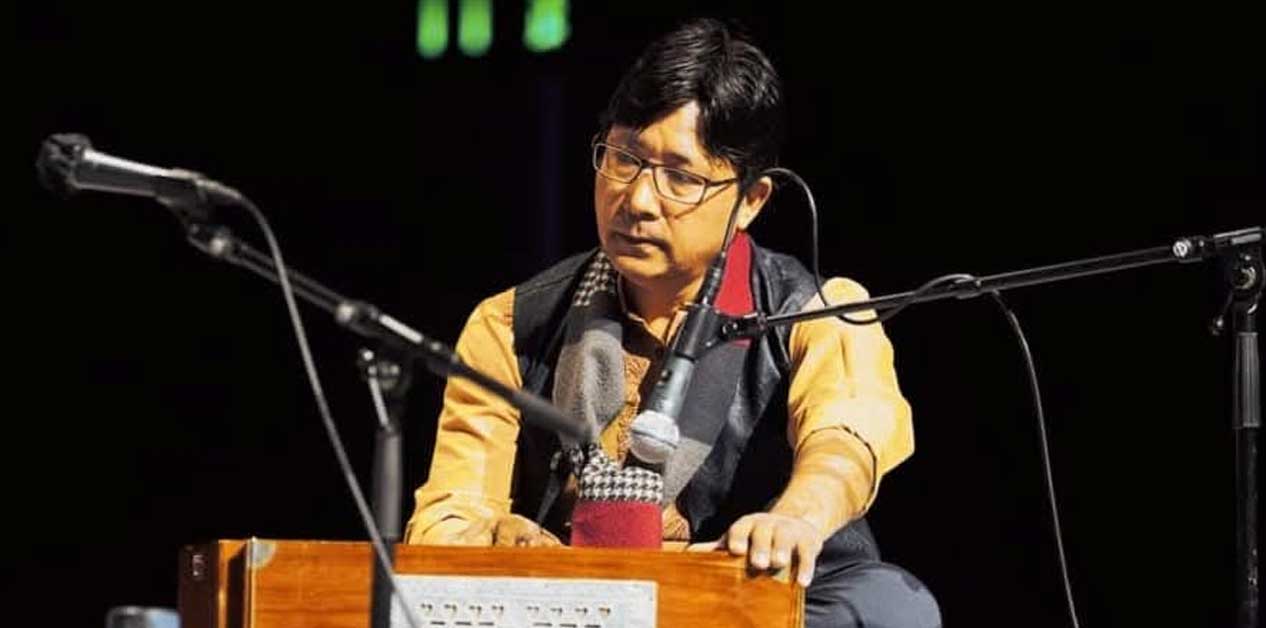

KATHMANDU: The following lines are instantly recognizable in Nepal, forming the core of a Tihar classic that fills the airwaves and is sung during festive Deusi-Bhailo celebrations every year:
“Speak with a smile, sister, during Tihar time.
You shouldn’t be angry, lailai, just laugh and play.
If you smile, the flowers smile,
If you cry, the tears stream down.”
Despite its enduring popularity—a song that was featured in the film Maiti two decades ago—the identity of the singer remains a mystery to many.
The vocalist who achieved fame through the song yet remained largely in the shadows is Naagendra Shrestha.
Once a prominent and busy singer, Naagendra’s story of recording this Tihar hit and the subsequent obscuring of his name is truly unique.
Early career and the move abroad
Naagendra’s musical journey began early; his songs were broadcast on Radio Nepal by the time he was just 20. He recorded tracks for albums and films, successfully establishing his identity as a singer. However, while the songs brought him fame, they did not bring fortune.
Around 1989, he moved to Hong Kong. There, he seized opportunities to perform in musical programs. His voice was well-received, leading to more invitations and securing a job singing at an Indian restaurant.
Naagendra would occasionally return to Nepal for recording. During one visit, musician Laxman Shesh asked him to record a Tihar song for a film, in addition to a track for another movie, Chot. He traveled to Kathmandu and recorded the hit single, composed by Shesh with lyrics by Dayaram Dahal.
The song, featured in the film Maiti starring Shree Krishna Shrestha, Niruta Singh, and Jharana Shah, became a massive success. Nagendra returned to his work in Hong Kong, and the song became an annual Tihar staple. He often heard it playing, even in Hong Kong. While he enjoyed the song’s widespread success, the public didn’t know his name. “I couldn’t exactly tell people, ‘I’m the singer of this,’ so I would just be secretly happy to myself and move on,” he recalls.
The correction and recognition
Naagendra’s obscurity was compounded by a persistent error: for years, Music Nepal had incorrectly credited the song’s vocals to Udit Narayan Jha, Deepa Jha, and Anand Karki on their YouTube channel. Naagendra only discovered this misattribution a year and a half ago, six years after the video was posted.
He immediately contacted Santosh Sharma, the operator of Music Nepal. “They apologized and corrected the error,” he states. “Now, my name is accurately listed.”
Since the correction, he has finally begun to receive recognition, with many people asking in surprise, “So, you were the one who sang that famous song?”
A four-decade musical legacy
Nagendra’s musical career spans nearly four decades. His early work includes the song Tadha Dherai Tadha Mayalu for the 1984/85 telefilm Tadha Ko Basti. He then recorded Chandani Ma Bagcha Kholo, setting lyrics by Kanchan Pudasaini to music by Shambhujit Baskota. The popularity of these songs soon earned him opportunities in film.
He has contributed his voice to Nepali films like Bhariya, Gunyu Choli, and Pocketmar, as well as various advertisements. Even while residing in Hong Kong, he continues his musical work, focusing more on instrumentation and production than on singing.
He has played instruments for programs featuring many renowned Indian artists, including Kailash Kher, Pankaj Udhas, Priti Seth, and Jeetu Shankar.
Nagendra has also released the album Aawaj, which features his own music set to lyrics by Ramkrishna Bantawa. His compositions have been sung by a mix of established and new-generation artists, including Deep Shrestha, Satya Raj Acharya, Sworup Raj Acharya, Anju Panta, Yam Baral, Rachana Rimal, Pratap Das, Kiran Bhujel, and Sunita Karki. Anju Panta and Rachana Rimal have even sung Hindi songs composed by him.
He learned Nepal Bhasa songs from his mother. His wife, Rachana Pradhan, is also a lyricist, and his son is a sound engineer. Despite the amenities of life abroad, Nagendra remains tethered to his roots: “No matter how many facilities and conveniences I have overseas, my heart aches somehow when I am not in my own country,” he says. “I plan to return to Nepal in the future and dedicate my life to the music industry.”